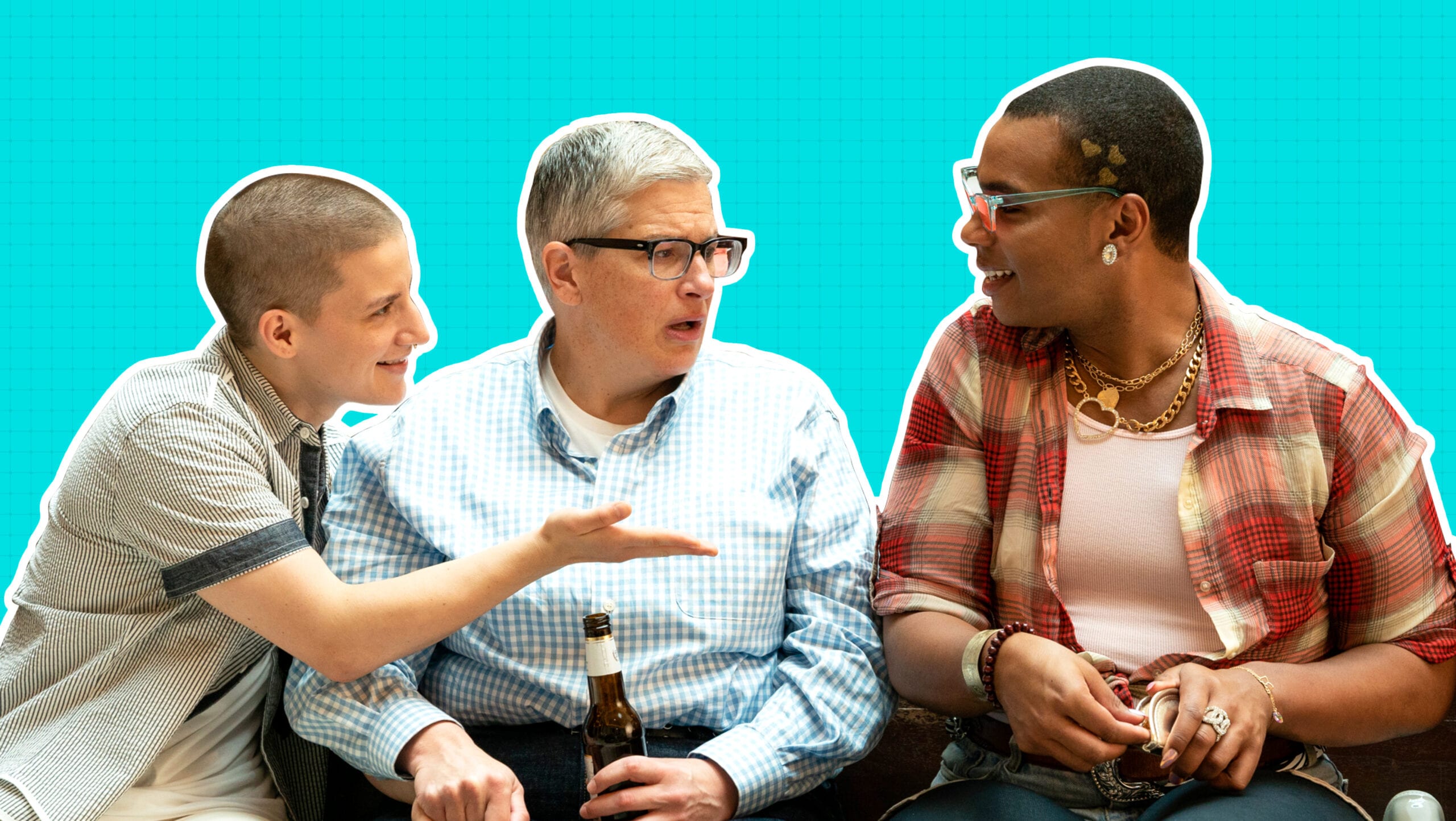Work in Progress, Showtime’s new comedy co-created by Abby McEnany, is the best thing on television. I know: You’re rolling your eyes. Trust, I’m rolling mine too. But it’s not often that our lives as queer and trans people are as deftly portrayed onscreen as they are in this show. From the way it depicts how we have sex and embody our sexualities to its incisive critique of the pop culture of yesteryear, Work in Progress is the series you didn’t know you needed.
A half-hour comedy that airs after the network’s The L Word: Generation Q, Work in Progress is loosely based on McEnany’s own life. Her eponymous character is one of two things: Either a 45-year-old “fat, queer dyke” finally growing to accept herself, or a 45-year-old “fat, queer dyke” on the road to suicide. Both are true; it just depends on which day you meet her. But when she gets into what becomes a transformative romantic relationship with a younger trans man named Chris, played by The Politician’s Theo Germaine, things seem to take a turn for the better. Karin Anglin, Celeste Pechous and Julia Sweeney also star in the series, produced by Lilly Wachowski (one half of the trans sister director duo behind the Matrix franchise).
Work in Progress is the series you didn’t know you needed.
From the very first scene, this show packs a hilarious punch. “I’m gonna kill myself in 180 days if things don’t get better,” Abby tells her therapist. She goes on to explain that a coworker, who has witnessed her fluctuating weight, took it upon herself to buy Abby a Costco-sized jar of almonds. This petty and disrespectful gesture is the straw breaking the camel’s back—Abby already feels like she’s more of a burden to her family and friends than she is of any use. So she resolves to complete suicide once she has disposed of 180 almonds, one each day until the end. Seeking a response, Abby glances over to see a lifeless grin on her therapist’s face who, it turns out, has died mid-session. Dark, I know; gut-wrenchingly funny nonetheless.
Beyond the plentiful laughs Work in Progress hides around every corner (surely a nod to McEnany’s improv background), the show’s depiction of the relationship between Abby and Chris elevates it from tragicomedy to necessary viewing. The couple first meet at a restaurant where Abby and her sister are having lunch. Chris is their waiter. After they pay, Abby’s sister circles back and gives him Abby’s number. At this point, they think Chris is a masculine-presenting woman. When he finally calls Abby, Chris discloses that he is a trans man. Without missing a beat, Abby agrees to go on a date with him. It’s a refreshing exchange I don’t think I’ve seen on television before—at least not done positively. Finally, the complexities of our human attractions are given their on-screen due.
As queer and trans folks, we have the privilege of not having to restrict our ideas about relationships to the cishet standards we were taught by our parents and mainstream media. Being LGBTQ affords us the ability to envision a love—and lust—that is uniquely ours. All too often, however, when our relationships are put on screen, queer and trans characters aren’t allowed to be as complex as our multitudinous lived experiences.
Work in Progress perfectly captures the awkward—yet necessary—navigation of consent and desire. In the lead-up to Abby and Chris having sex for the first time, the two are forthcoming about what they like and don’t like in bed: From no-go zones on the body to the best terminology to use when referring to certain parts—all the while riding in an Uber pool! There is even a frank conversation about sexually transmitted diseases and sexual history. And what we don’t get from Chris and Abby’s relationship, we get from their friend group: Throuples, sexual fluidity and unabashed freedom. Combined, this all works to remove the stigma (internalized and projected) around these oft-deemed “taboo” topics—work that countless queer and trans people do in real life without even knowing it.
But beyond how the show authentically renders our romantic relations onscreen, it corrects the pop culture record by centring the criticisms of queer and trans people. Most notable is a storyline involving Julia Sweeney, who plays herself. Sweeney is best known for a popular Saturday Night Live character she created named Pat. The character first appeared on a December 1990 episode, the punchline being the inability of others to determine Pat’s gender. Pat became so popular and beloved—even being named one of the best SNL characters ever by Paste magazine in 2012—that Sweeney starred as the character in the slapstick 1994 film It’s Pat. But the character is rooted in transphobia, a point Abby and Chris are able to make after becoming friends with Sweeney in Work in Progress. They note that Sweeney caused Abby a lot of strife because many likened her gender presentation to Pat’s.
Then there’s Weird Al Yankovic and his 1988 song “Fat.” In the show, Yankovic plays a version of himself who is married to Sweeney’s character. Over dinner, he makes jokes about the medical community being offended by another of his songs from the ‘80s about surgeons. Abby, however, isn’t entertained, telling him that “Fat” actually made light of larger-bodied people like her and helped make it okay for others to bully them.
There’s a power in this particular form of social commentary that can’t be understated. To have the real-life people who created these anti-trans and fatphobic pieces of media that defined a generation of pop culture atone for their ignorance and missteps onscreen is truly radical. It’s the type of accountability we need to be seeing from those responsible for the proliferation of problematic content of years past, and Work in Progress makes it happen more than once.
I’m willing to bet there is no other show on television doing the work of Work in Progress. This, I know, is a large claim with almost 500 scripted programs in the ether. But how many of those shows feature LGBTQ characters, created by LGBTQ people for LGBTQ people? And how many of those centre the perspective of a “fat, queer dyke” who is the subject of her own narrative? I’ll wait.
Just tune in. I promise you won’t be disappointed. And hell, you might discover a new show to add to your list of great queer and trans storytelling to emulate.


 Why you can trust Xtra
Why you can trust Xtra


